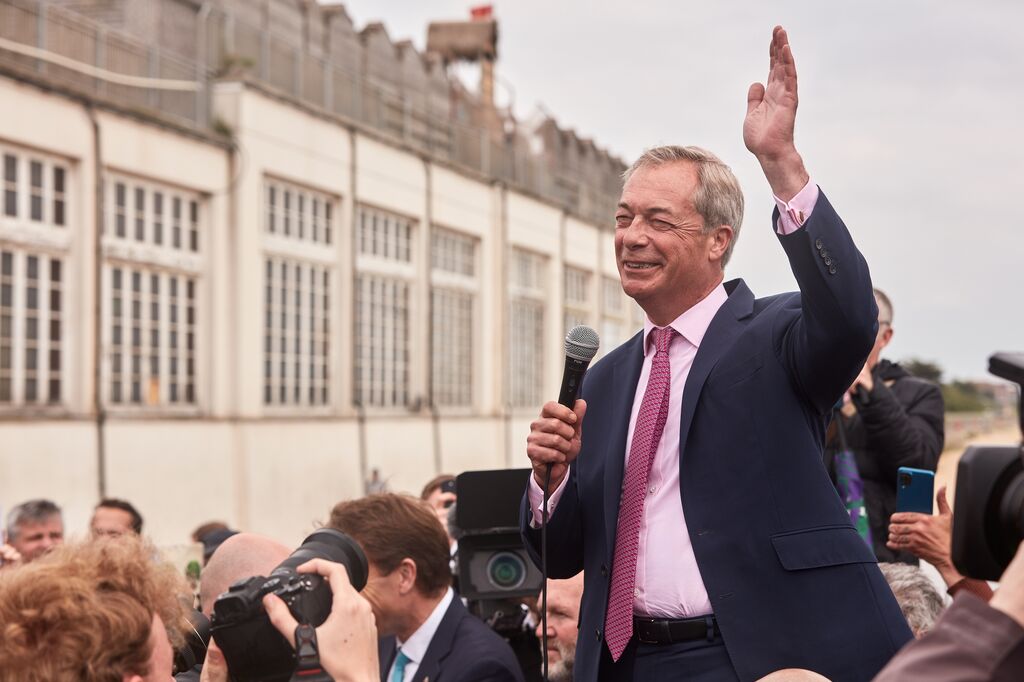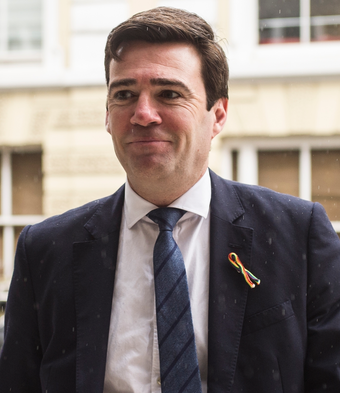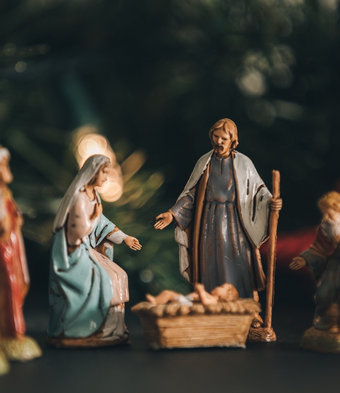We need to talk about Nigel...

The following article represents the views and thoughts of its author. CARE is neither for nor against any one particular candidate or political party, but supports good government, wherever it is found.
We need to talk about Nigel. Everyone else is. Just look at the questions which were put to Keir Starmer this week after his speech at a factory in the north-west.
BBC: "Is today's speech an admission of your popularity failure, and Nigel Farage is soaring?"
Sky News: "Are you running scared of Reform?"
LBC: "Why are you holding a press conference about Nigel Farage four years from an election?"
GB News: "Are you panicking? Is Farage rent-free in your head?"
ITV: "Do you view Nigel Farage as your main opponent?"
Behind closed doors, a couple of weeks ago, Keir Starmer is reported to have said to Labour MPs that - whatever the Parliamentary seats might say - in his mind, Reform was now the main opposition to the Labour Party. The Conservative Party is increasingly targeting Reform in its social media content. And Reform was comfortably the winner at the local elections in May: it won the most seats, and became the largest party on 17 of the 23 councils.
YouGov polls, which assess which party people would vote for if there were a General Election tomorrow, currently places Reform at 29% (by way of comparison, it attracted 14% of the vote in the 2024 General Election). Labour are down at 21%. The Conservatives - who were even briefly overtaken by the Lib Dems a couple of weeks ago - are languishing at 19%.
Of course, a week is a long time in politics, let alone four years, and breaking up a two-party system which has stood for generations is easier said than done. Older readers will remember the so-called ‘Gang of Four’, who left the Labour Party in 1981 and entered into an alliance with the Liberals. The SDP-Liberal Alliance at one stage hit as high as 50% in the polls. This was twice as high as the Conservatives, who after Thatcher’s strong position on the Falklands, would go on to claim an enormous victory in the 1983 General Election, leaving the Alliance with just 23 seats.
But whether you like them or loathe them, the odds are that people you know (or indeed, you yourself) are weighing up support for Reform at the moment.
There are some subjects we write about where we know that - regardless of what we say - we will attract criticism. This is one of them!
If you are a Reform fan, you might find criticism of Farage frustrating; if you are strongly opposed to them, you may think that I haven’t been strong enough in what I say. As ever, it is important to restate that CARE is strictly politically neutral; we support good policies, in whatever corner they are found. We do not support - or oppose - any one particular party, or candidate.
Rather we want to weigh up everything against a Biblical worldview, in full recognition both that every human being (and every political leader) is created in the image of God, and, by his common grace, is capable of real good, and that every human is also subject to the Fall, and a sinner who falls short of God’s glory.
It is to be expected that in political leaders, parties and ideologies, there will be things to affirm, and things to critique.
(Of course, that also does not mean that all personalities and parties equally represent God’s vision for human flourishing either. As Christians, we are not moral relativists; to parody the beleaguered Tory leader Kemi Badenoch, ‘not all cultures are equally valid’!)
The politics of dissatisfaction
The rise of Reform arguably says more about the failure of our political establishment than anything else.
Just as the SDP-Liberal Alliance arose at a time of severe dissatisfaction with both the Conservatives, when unemployment rose to 3 million under Margaret Thatcher, and the Labour Party, led by the hard-left Michael Foot, whose election manifesto became known as the ‘longest suicide note in history’, Reform are taking advantage of a vacuum in British politics.
The Conservatives are tainted by having managed 14 years of decline, much of which they spent being wracked by in-fighting and replacing their leaders. It will be no surprise if Kemi Badenoch, unable to reverse the decline, is removed from post within the next couple of years.
Labour might have won an enormous majority, as a result of our first-past-the-post electoral system, but it was not for nothing that it was called the ‘loveless landslide’, with their 33.7% of the vote being considerably less than the 40.0% they had received when losing under Jeremy Corbyn’s leadership in 2017. Their honeymoon is well and truly over; although the headlines around the Local Elections tended to focus on the Conservative losses, they were just as catastrophic for Labour too, who also lost ⅔ of their seats (and were beginning from a much lower base).
Although there is a tendency to think of Nigel Farage as a threat primarily to the Conservatives, he is also troublesome for Labour; Reform came second to Labour in 87 seats in the 2024 election, and the spectre of Farage loomed all over Keir Starmer’s ‘island of strangers’ speech a couple of weeks ago.
In short, Farage, and Reform, are the beneficiaries of political failure.
On one level, it is a good thing that successive governments are being held to account. The Conservative government promised in 2010, 2015, 2017, and 2019 that it would reduce the levels of immigration. In the first three of those, it promised to reduce figures to the tens of thousands. Instead, the reverse happened: the net migration levels rose to the highest in Britain's history by far.
At their height, in 2022, net migration levels stood at 764,000. Last week, the figures for 2024 were released; they finally saw a large reduction to 431,000 (still one of the highest levels in Britain’s history), after policies enacted by the Sunak government began to have an effect.
You can’t add the equivalent of a city the size of Manchester to your population every year, when the people have voted for the exact opposite repeatedly, and expect there to be no consequences. The political establishment promised one thing, and repeatedly delivered another. Regardless of your views on immigration itself, that is not how democracy is supposed to work. Promises are supposed to matter.
On the other hand, it is much easier to tear down than it is to build something new. What are the positive, hope-filled solutions that Reform will offer?
I know well what Reform stands against; it’s against high migration, it’s against net-zero, and it’s against wokeism. That’s all well and good, and, as someone who leans to the political right myself, I have sympathy for some of that.
But the Bible speaks about government having a dual function: governments are supposed to both restrain what is evil (aka, be against some things) and to promote what is good (aka, to be for others).
Of course, as Christians, we believe that we can find God’s positive vision for human flourishing in the Bible, whether it is in the importance of protecting the vulnerable, or upholding justice, or speaking up on behalf of institutions like marriage and the family.
So what are Reform for? As Nigel Farage attempts to forge a path to Number 10, I’ll be interested to see whether he can turn Reform from being a protest-party into a party which offers a coherent, positive worldview around human flourishing.
The end and the means
Nigel Farage’s speech this week touched on many points which, as Christians, we would agree with.
Perhaps the most eye-catching was his proposal for a transferable tax allowance of up to £25,000 for married couples. Recognising that his “own track record was not so good on this”, after being divorced twice, and stating that he was “not moralising”, he argued that "making marriage a little bit more important" was "the right thing to do", as it gave children "the best chance of success".
At CARE, we have long called for reform in the tax system for married couples through our Taxation of UK Families Report. In removing the recognition of marriage from the tax system in 2000, Britain became the only OECD (Organisation for Economic Co-operation and Development) economy of its size not to recognise marriage in its tax system. Imagine a one-earner married couple with two children on average wages. In the UK they would pay 70% more tax than a comparable French family, more than twice as much as a comparable US family and 15 times as much as a comparable German family.
As Christians, we believe that marriage is an institution ordained by God, and built into the fabric of humanity:
“Haven’t you read,” Jesus replied, “that at the beginning the Creator ‘made them male and female,’ and said, ‘For this reason a man will leave his father and mother and be united to his wife, and the two will become one flesh’?” (Matthew 19:4-5).
It is no surprise to us when the evidence shows that lifelong marriage is generally the best foundation for a family, and for raising children, because the Bible got there first!
Family breakdown results in a number of negative outcomes for children. The CSJ found in 2019 that children in broken families are more than twice as likely to experience poverty than those whose families stay together. They are 2.3 times more likely to experience homelessness, 2.0 times more likely to have trouble with the police, 1.8 times more likely to experience alcoholism, and 1.7 times more likely to experience mental health issues. The consequence of divorce has actually been shown to have a greater impact on children’s education than parental death.
This was not the only measure announced by Farage which will appeal to Christians. He also said that he wanted to scrap the two-child benefit cap, which has done such damage; the Child Poverty Action Group estimates that around 350,000 children would be lifted out of poverty if the cap were abolished. In a 2023 report, the Resolution Foundation predicted, “[Relative] Child poverty in 2027/28 is forecast to be the highest since 1998/99, meaning 170,000 more children will be in poverty than in 2021/22. This rise is driven entirely by large families: child poverty for families with three or more children is set to hit 55% in 2027/28, and 77% of children in families with four or more children will be in poverty by 2027/28.”
And in response to a question about abortion, although he confirmed that he was pro-choice, Farage said that it was “utterly ludicrous” that abortion was allowed up to 24 weeks, given that hospitals “move heaven and earth” to help babies survive who are born at 22 weeks.
So on the face of it, there is much there which we might agree with! Sure, we might feel uncomfortable sometimes with some of Reform’s rhetoric around immigrants, and we might not feel like Farage comes across as the most trustworthy chap, but surely the end justifies the means…?
Except that, within the Christian worldview, I don’t think that the end does justify the means. We do not believe in utilitarianism.
Yes, we pray that God’s kingdom might come, on earth as in heaven, and we believe that we are to act as Jesus’ hands and feet here on earth. But we also remember that ultimately it is God who is responsible for the results:
“Unless the Lord builds the house, the builders labour in vain” (Psalm 127:1).
As Christians, we want to be fruitful. But it is far more important to be faithful; faithful to Jesus, and faithful to the distinctive life to which he calls us. God wants us to “not conform to the pattern of this world, but be transformed by the renewing of your mind” (Romans 12:2) and is changing us into the likeness of his son, Jesus.
In his book, ‘Here are your Gods’, Chris Wright draws on church history to warn about the dangers of Christians pursuing political power.
“It seemed natural, perhaps even providential, that the power of the state should promote and protect the interests of Christianity, while it might be hoped that Christianity would sanctify the workings of the state. Unfortunately, the price Christianity paid for its protection was its own corruption and complicity in the greed, ambition, immorality, endless conflicts, and endemic violence of all-too-fallen and sinful human power structures, and those who used them for their own enrichment. In gaining the world (or at least a continent), we lost our own soul…When we declare that Jesus is Lord and not Caesar, we are acknowledging that we are called to follow the Jesus of the cross, not the Jesus of Constantine.”
Do not put your trust in princes
None of the above is to say anything directly about Nigel Farage’s own character; you might agree with the warnings around political power, whilst also believing that the Reform leader is no worse than the rest of the politicians.
Others of us might be more nervous.
For instance, it is one thing to be against high levels of immigration, but that can very easily slip into making immigrants into scapegoats. We saw where that can so easily lead last summer, with the ugly scenes of riots and attempts to burn hotels in which migrants were staying. I was very glad when Nigel Farage spoke against the violence, and I do not doubt his sincerity in deploring it.
But rhetoric does not exist in a bubble, and Farage was also criticised by the former head of UK counter-terrorism for suggesting that the truth was being withheld from the public and inflaming pre-existing tensions. (Interestingly, it feels to me like Farage has softened his anti-immigration rhetoric in recent months, speaking about still allowing immigration for areas with skills shortages a couples of weeks ago.)
And his own management of the Reform Party gives cause for concern. The former head of Reform, Ben Habib, who quit the party a few months ago, said back in January: “My fundamental disagreement with Nigel is that he is in total control of Reform UK. It has no democracy and no checks and balances in place…The constitution is fixed in Nigel’s favour. He doesn’t trust his members.”
Since then, Farage says he has handed over control of the party to its members; in reality it is owned by a not-for-profit controlled by himself and the Reform chairman Zia Yusuf. Although, in theory, Farage can be ousted as leader, this will only occur if half the members (there are over 200,000) write in requesting a vote of no-confidence; or if half the MPs request such a vote, but that rule only kicks in once Reform has 100 MPs (it currently has 5), making it inapplicable.
It was interesting to read the comments from one of Farage’s own (ex-)MPs, Rupert Lowe (shortly before he was suspended from the party); he claimed that Reform was "a protest party led by the Messiah".
Whether you are a Farage fan or not, it is important to remember that there is only one Messiah.
Regardless of which party you support, or which leader is your favourite, I think the words of Psalm 146 are helpful:
“Do not put your trust in princes, in human beings, who cannot save. When their spirit departs, they return to the ground; on that very day their plans come to nothing. Blessed are those whose help is the God of Jacob, whose hope is in the Lord their God.” (Psalm 146:3-7).
Tony Blair. Boris Johnson. Nigel Farage. They're the three politicians to have transcended politics in my lifetime. Blair is now remembered primarily for his catastrophic decision to support the invasion of Iraq. Boris' stint in Number 10 ended in disgrace and disaster after Partygate, Peppa Pig-gate and Pinchergate.
Who knows where Farage's story will end. But if you put too much trust in any political leader, you are sure to be disappointed. There is only one Messiah in whom we can truly trust; there is only one who will genuinely make all things new.
Isaiah saw the coming of his glorious day, and said:
“Of the greatness of his government and peace there will be no end. He will reign on David’s throne and over his kingdom, establishing and upholding it with justice and righteousness from that time on and forever.” (Isaiah 9:7)
Whatever our political persuasion, let’s keep our eyes fixed on Jesus and His Kingdom, in the knowledge that only He will never let us down.






